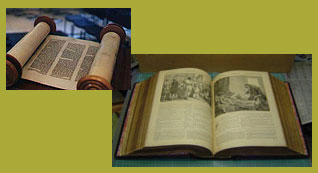
All Children of God
God does not renege on His Promises, even when we fail Him with our infidelities and ingratitude. This also applies to the Jewish people, for God unlike fickle man keeps His Covenant even with an errant and 'stiff necked' people. God does not nor cannot revoke a Covenant, for The Triune Spirit is not capricious nor does God rely on man to feel validated.
Therefore the Promises and Covenants which God made to the Jews, also applies and incorporates the Gentiles. For if God were to break His Covenant with the Jews, what then would save us?
Are we so perfect so holy, that we have no need to rely upon God's Promises, that He will never forsake us?
For if we go on the premise that God will not keep His Covenant with Israel, because of their infidelities and rejection of the Promised Messiah, what hope then is there for the Gentiles?
Do we not also when we sin, reject the Messiah? Yet we hold as Truth that God will never abandon us. The confusion comes when we think we are loved because we are good, NO! We are Loved because God is Good!
Everything depends upon God and not man; therefore if God were to break His Covenant with the Jews, then He will also break His Promise to the Gentiles, which would then make Jesus' Sacrifice on the Cross, 'conditional'! Did Jesus apply any 'conditions' to St. Dismas who had NOT led a holy or meritorious life? Yet through Jesus' Sacrifice on the Cross He Promises this thief eternal Salvation with Him in Paradise. Did St. Dismas earn his Salvation or is it Gift from God Himself, not because we can earn or merit our Salvation but because of God's Saving Grace!
Is this what the Bible and the Catholic Church teaches us? That we are saved not because of Jesus Salvific Sacrifice and Atonement, in which He took our place and removed the sting of death from all who believe in Him. Has it come to the point where many believe we must 'earn' our Salvation or that we can merit our eternal life in the belief we are saved on our works alone and NOT on Christ Himself? Or that we as Catholics are saved by God simply because we term ourselves 'Catholic', in the belief that we are an 'elitist' group, therefore Salvation belongs to us and nobody else!
If this is the premise of what some consider to be true then they have nullified God's power and His Grace and negated Christ’s Passion!
For when God made His Covenant with the Jewish people, He did so in full knowledge that these same people would reject His Beloved Son, Jesus. For unlike man God has Predestination and He knows the outcome before He reveals and establishes His Covenants with the Israelites and also with the Gentiles.
There are some who believe that because God made these Promises in the Old Testament, therefore they have no relevance in the New Testament. In that Jesus, brought a New Law, this is correct, but Jesus also came to fulfill the Old Testament not to break it! Hence this is the reason why Paul asserts in his letter to the Romans that, "God has not rejected His people whom He foreknew"(Rom 11:2). Obviously Paul is referring to Jeremiah 31:34; and Paul continues to say, "As far as the Gospel is concerned, they are enemies on your account; but as far as election is concerned they are loved on account of the patriarchs, for God's gifts and His call are irrevocable."(Rom 11:28-29).
It cannot be stated more plainly than this, God does not break His Covenants, however unfaithful His children will be. For upon Jesus birth, death and Resurrection a Light was shone in which NO power can extinguish!
Peace of Christ to you ALL
Copyright © 2005 Marie Smith. All rights reserved.

